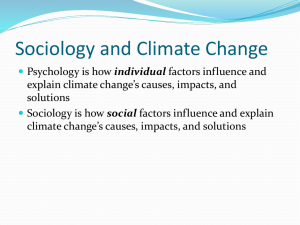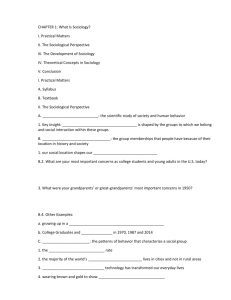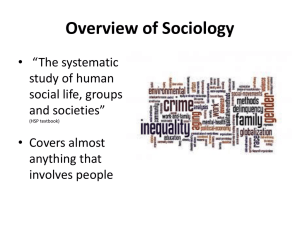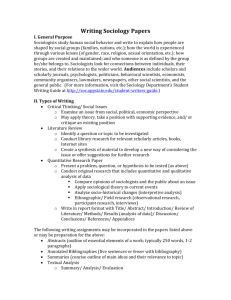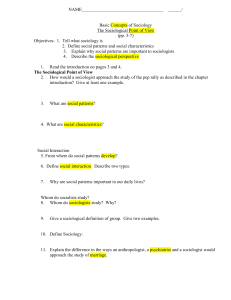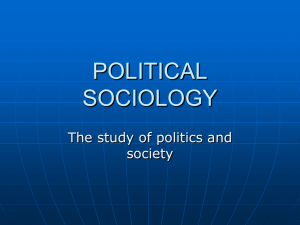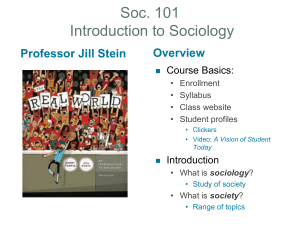Social factors drive consumption
advertisement
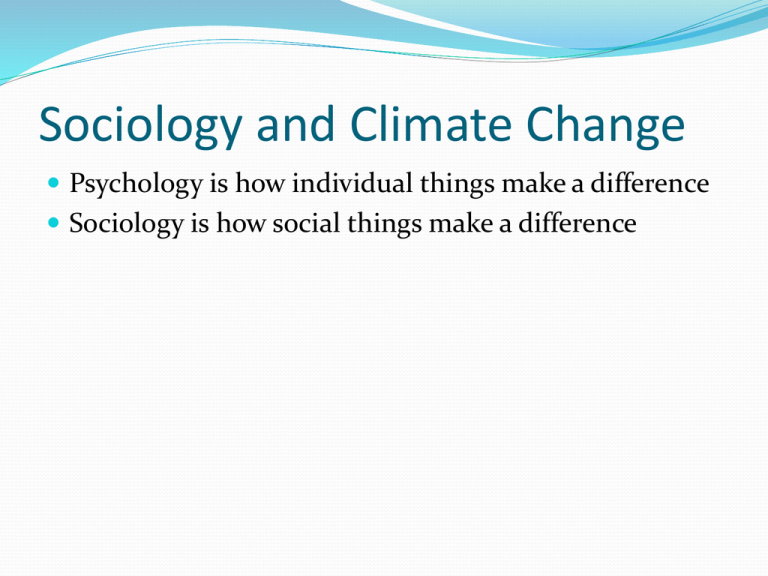
Sociology and Climate Change Psychology is how individual things make a difference Sociology is how social things make a difference Findings from sociology: causes of climate change Political economy matters: emissions reflect how we organize politically and economically Human ecology matters: climate change is global but effects depend on local social/political conditions Social factors drive consumption: excessive consumption related to status-seeking and advertising Social factors influence knowledge and response: acceptance and response to science is socially driven Social organization of science policy matters: ability to learn and respond depends on our institutions NSF Workshop on Sociological Perspectives on Global Climate Change, 2008 http://www.asanet.org/research/NSFClimateChangeWorkshop_120109.pdf Findings from sociology: impacts of climate change Environmental justice: impacts differ by social and economic categories Disasters: impacts of, and response to, disaster depend on social structures (who empowered, who not) Human health: social and health inequalities tend to exacerbate climate change health impacts Security and conflict: impacts depend on how CC interacts with security concerns, e.g., migration Social demography and population: response to CC depends on race, gender, class, age structure of society NSF Workshop on Sociological Perspectives on Global Climate Change, 2008 http://www.asanet.org/research/NSFClimateChangeWorkshop_120109.pdf Findings from sociology: mitigation and adaptation Multi-level governance: from property rights to global governance, social organizational rules matter Decision making and risk assessment: how we assess risk and decide how to respond is socially driven Cultures of consumption: consumption relates as much to social identity as material needs Advocacy and action research: social structure influences success of mitigation and adaptation policies Organizations and networks: how does social organization foster or inhibit mitigation and adaptation NSF Workshop on Sociological Perspectives on Global Climate Change, 2008 http://www.asanet.org/research/NSFClimateChangeWorkshop_120109.pdf Leiserowitz and Fernandez: Social, not personal, drivers Deep-seated norms that are “taken for granted” So accepted we don’t even see them Anthropocentrism, materialism, and alienation from nature Reductionism Binary and dichotomous thinking Radical individualism Economism Cornucopianism and technological optimism Leiserowitz and Fernandez: Social, not personal, drivers Institutions: media, academia, humanities, environmentalism, policy, philanthropy Norms and beliefs Environmental issues lack urgency. Scientists should not advocate. Environmental behavior is an individual responsibility. Consumerism as the basis of self-identity. Solutions New narratives Science and education Religion and ethics Policy and economics Norgaard: Sociology of denial NOT a personal denial but a systematic social explanation Research question: “What can explain the mismatch between scientific information and public concern?” Puzzle: “Why most people who say they are concerned about climate change nevertheless manage to ignore it.” Good case: “High standard of living and high levels of political involvement make Norway a useful place to explore questions about apathy toward climate change. If any nation can find the ability to respond, it must be in a place such as this, where the population is educated and environmentally engaged.” Norgaard: Sociology of denial “To avoid emotions of guilt, fear, and helplessness, people in the Norwegian community I studied changed the topic of conversations, told jokes, tried not to think about climate change, and kept the concept off the agenda of political meetings. Community members collectively held information about global warming at arm's length by following cultural norms of what to pay attention to, what to talk about, and what to feel.” “The public silence comes from people who -- despite understanding and caring -- actively mute out the climate crisis in order to protect their senses of identity and empowerment as well as to maintain culturally produced conceptions of reality.” “Working together may, over time, create the supportive environment that is a necessary (though not sufficient) condition for people to face greater fears about the future and engage in large-scale social change.” Norgaard: Sociology of doing climate science Attack by Limbaugh Discussion: Do politics play a role? Does gender play a role? Does socio-economic statues play a role? Does race play a role? Do norms of discourse play a role? York article - discussion What are take-away messages? York article - takeaways “Things don’t turn out exactly as you would expect.” Assumption that increasing renewables will decrease fossil-fuel energy correspondingly “is clearly wrong.” 1 unit non-fossil energy replaces 1/4 unit fossil energy 1 unit non-fossil electricity replaces 1/10 unit fossil electricity Renewable technologies, alone, are not enough. Example: driving a Prius increase MPG decrease fuel costs drive more miles Implication: Need to develop alternatives but also change political / economic context to make decreasing fossil fuel use easier
